Welles beyond Kane
 Friday, December 18, 2020 at 8:00PM
Friday, December 18, 2020 at 8:00PM 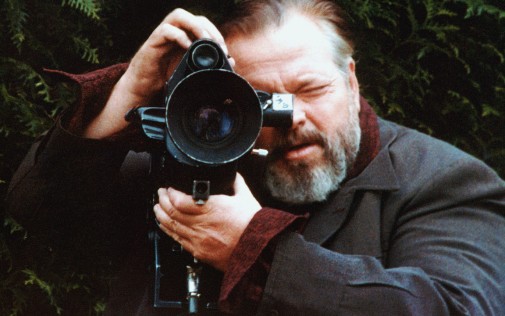
With David Fincher's Mank on Netflix, many have been talking about Citizen Kane. The writing of Orson Welles' putative first feature (technically, though unfinished, Too Much Johnson precedes it by three years) is central to the new movie, but the narrative is far more interested in the 1934 California gubernatorial election than in the shooting of Kane. We never see cameras rolling on that which has been, at one point, considered the best movie ever made. Whether you agree with that hyperbolic title or not, it's undeniable that it's one of the most written about works ever produced by Hollywood, with essays such as Pauline Kael's Raising Kane enshrining the picture in prestige and controversy.
While I admire Citizen Kane and find it a masterpiece, I must admit to being far more fascinated by Welles' later efforts. Through exiles and a myriad of unfinished experiments, Orson Welles' filmography extends well beyond Kane…
Any personal musing of mine about the legacy of Orson Welles would be incomplete without me mentioning the blissful fact that I watched the majority of these flick on the big screen. That was possible thanks to the Portuguese Cinematheque, which presented a retrospective on Welles to celebrate his centennial in 2015. I spent many an afternoon letting myself be spellbound by what I saw projected on the silver screen, immersed in their mysterious allure.
The majority of those films were unknown to me, chronically under-discussed, and presented in different versions. It was like discovering some lost world of cinematic expression, a weird branch of Hollywood filmmaking that lost its mind and went wild in the old continent, a Shakespearean antithesis to Olivier's Bard adaptations that sacrificed rigid theatricality for lunatic cinematography. In many ways, watching Citizen Kane felt like homework. Discovering Welles' later pictures felt more intimate, personal, and idiosyncratic, just like the movies themselves.
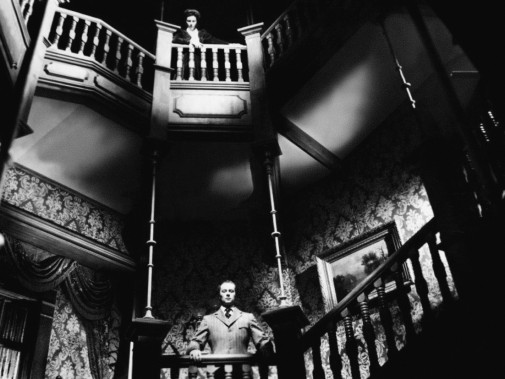
THE MAGNIFICENT AMBERSONS (1942)
Ravishingly shot by Gregg Toland, this Gilded Age family drama chronicles the titular clan's degradation over the years. From what we can see on the picture's present form, it's a work of directing even more sophisticated than Kane, more ambitious too, almost radical. While singing a funeral march for a dying breed of American aristocracy, Welles paints the portrait of a changing world with brushes dipped in venom, pencils filled by a lead of fossilized humanism. A haunting in celluloid, it's a film about ghosts wailing as they slam against modernity and find themselves obsolete.
The Magnificent Ambersons is streaming on TCM.
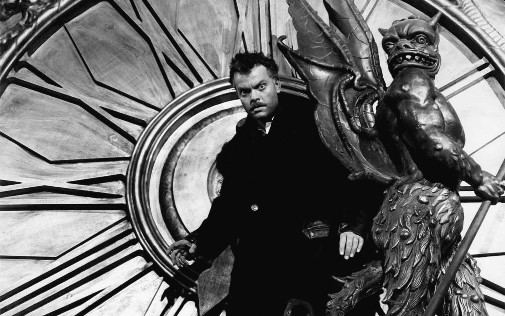
THE STRANGER (1946)
Welles' feeble attempt at proving he could do commercial Hollywood Pablum was a shot in the foot. By far the least interesting of the director's finished pictures, it does feature some nifty camerawork, a spiffy symbolic clock tower, and the cineaste's unhinged performance as a Nazi murderer hiding in an American small town. Conventionalism was never Welles' friend, not even when clothed in the trappings of neurotic postwar film noir. Effective but ultimately disappointing.
The Stranger is streaming on Amazon Prime Video, Starz, Kanopy, and other services.
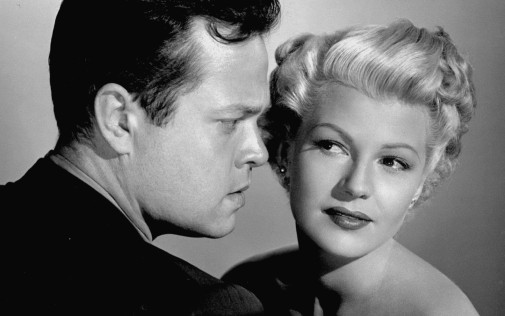
THE LADY FROM SHANGHAI (1947)
Its dizzying conclusion is justly iconic, but there's much more to The Lady from Shanghai than its labyrinthic mirrors. Above all else, the movie represents an attack on the institution of stardom itself, on Hollywood, twisting the persona of Welles' wife, Rita Hayworth, in bizarre, cruel configurations. Through a gangrenous descent into film noir hell, one feels themselves lose one's mind while witnessing the visual marvels the filmmakers have conjured, the sonorous distortions and dialogue philtered through clouds of intoxicated mania.
The Lady from Shanghai is streaming on Amazon Prime Video.
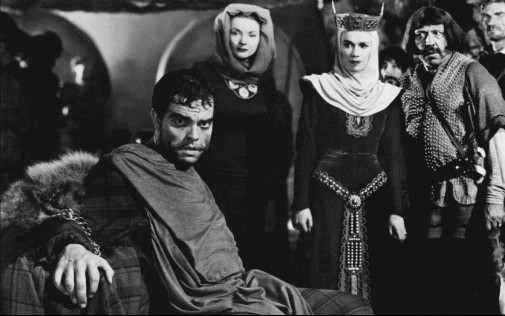
MACBETH (1948)
The director's first big-screen Shakespearean adaptation was his last American production before he exiled himself in Europe. Produced with a low budget and rudimentary means, the Scottish play gains a primordial sense of wrongness when thus presented. It's s a shadow play unraveling between rocky ravines, featuring kings costumed in cardboard crowns and armies turned into forests of spears. The viewer feels that there's strange alchemy at play. One that combines a quasi-minimalist design with Expressionistic form and a cast of actors willing to go to extremes to find (or not) the ugly truths of their roles.
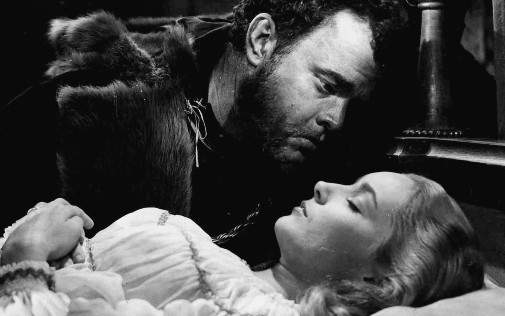
OTHELLO (1951)
A kaleidoscopic shattering of Shakespeare's Venetian tragedy, Welles' Othello won the Palme d'Or at the 5th Cannes Film Festival. While it's difficult not to cringe at the actor/director's Blackface, there's much to enjoy about the unnerving picture whose visions haunt, whose sounds torment, whose performances shine a light on the turpitude of the Bard's treacherous characters. The cutting is especially feverish, rendering the action into a hallucination that frightens with its abrupt rhythms, so sharp they draw blood and dilacerate flesh.
Othello is streaming on Kanopy, Popcornflix, and Mubi.
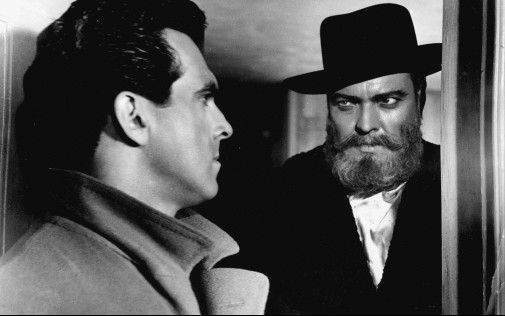
MR. ARKADIN (1955)
Slurred remembrances and scary tales, countless lies and illusions weave a tapestry that recounts the story of an old world's devil. The erstwhile enfant terrible of Hollywood found a new home in Europe and European cinema, making some of his most interesting pictures there. Mr. Arkadin represents the oddest of these experiments, concerning itself with an elusive mystery man and the impressions he left on those around him. In many ways, it's Citizen Kane's Baroque twin, though even more beautiful with all its bilious toys and ancient rituals, desolate buildings open to falling snow, circuses of fleas, Gothic close-ups.
Mr. Arkadin is streaming on HBO Max, the Criterion Channel, and Kanopy.
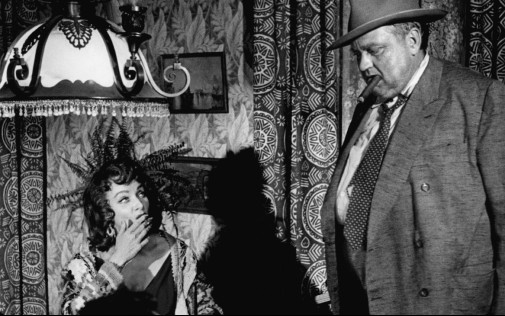
TOUCH OF EVIL (1958)
Classified by many as the last great noir, Welles' first American film in a decade found him indulging in some of the most elaborate camera choreography this side of Soviet cinema. More than mere technical wizardry, the movie's an oily tempest of moral rot and decay, a typhoon of lost souls and Mexican ennui, grotesque performances by the main cast, and a scene-stealing turn by Marlene Dietrich. Beyond its verminous splendor, Touch of Evil works as a dark tragedy, sorrowful as much as it is beastly.
Touch of Evil is available to rent from most services.
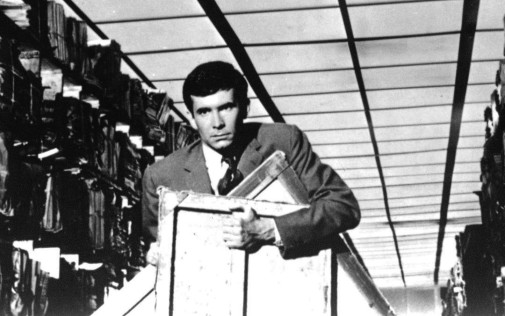
THE TRIAL (1962)
Welles' favorite from his filmography, this adaptation of Kafka's novel does the impossible. It successfully translates a seemingly unfilmable text to cinematic idioms that are as potent as the written word. Inspiringly disorientating, the picture drowns the viewer in bureaucratic absurdity, forlorn despair, existential dread. All odd angles and vertiginous sets, The Trial is oddly hypnotizing, like a creepy omen whose Wellesian abstraction beckons the viewer closer. The better to stab them with a blade of crystalized agony.
The Trial is streaming on the Roku Channel, Kanopy, and Fandor.
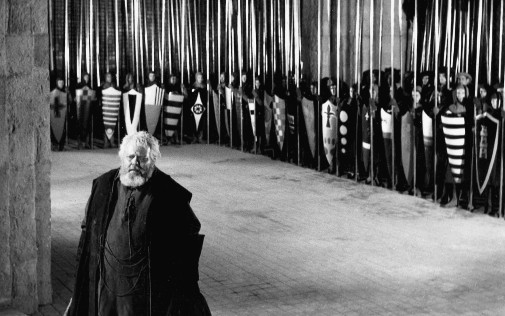
CHIMES AT MIDNIGHT (1965)
My favorite movie based on a play by William Shakespeare is this masterful adaptation that binds together the Henriad, reconfiguring its perspective to center Falstaff instead of Prince Harry. Welles himself gives life to the eponymous drunkard, finding comedy in tragedy and grief in humor, dissecting garrulousness with sorrow, contrasting robust physicality with the subtlety of expression. Along the way, he delivers the greatest performance of his career as an actor, a monument of drama that's matched in perfection by the deep-focus photography able to turn kingly castles into cold caverns, a tavern into a merry tomb.
Chimes at Midnight is streaming on HBO Max, the Criterion Channel, and Kanopy.
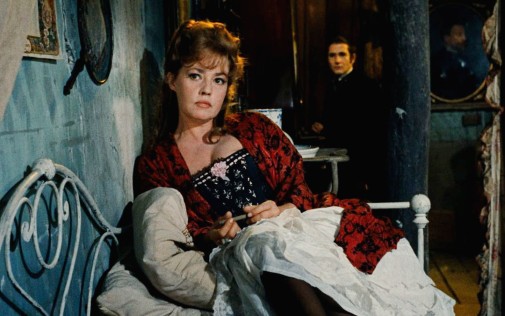
THE IMMORTAL STORY (1968)
Simultaneously a love letter to the magnetism of Jeanne Moreau and an evisceration of the role of the storyteller, the filmmaker, this '68 flick produced for TV is a sour conundrum. Welles himself denied the picture was a meta-commentary, but it's hard to watch the narrative unfurl without meditating on the similarities between the on-screen manipulator and his off-screen existence. Regardless of such auteurism-based preoccupations, The Immortal Story still beguiles, its perverse plots making for a strangely melancholic tale.
The Immortal Story is streaming on the Criterion Channel.
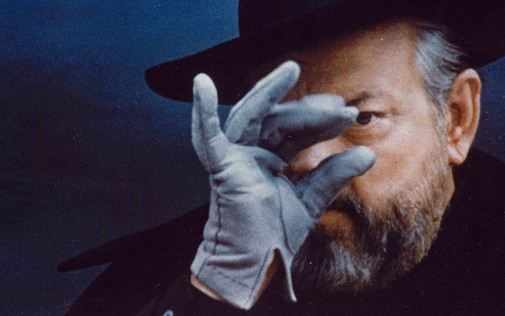
F FOR FAKE (1973)
The last completed film of this master trickster is a trick in itself. Welles' love for illusions is laced through his cinematic inspiration to make a documentary(?) about forgeries, lies, and frauds. An essay film that doesn't let itself be bogged down by academisms, F for Fake is a merry lark. The movie's out to confuse the viewer, but it also wants to delight, inviting us to share in the fun of a genius filmmaker and amateur magician having the time of his life. By the end, truth, as a concept, has lost all its meaning, and cinema, as an art form, has been taken to new paradigms of creative madness.
F for Fake is streaming on HBO Max, the Criterion Channel, and Kanopy.
Apart from those titles, Welles also directed many shorts, some TV, fascinating making-of docs, and a plethora of unfinished projects. Out of those, I especially recommend his Filming Othello about the shooting the Palme d'Or winner, an intimate and sardonic look at the chaos of filmmaking that's as entertaining as it is instructive. Also, The Other Side of the Wind's on Netflix, an unfinished movie about an unfinished movie, an aborted return to Hollywood, and a nightmarish look into Welles' view of the American film industry that so thoroughly rejected him.
What's your favorite of Orson Welles' pictures? Aside from Citizen Kane, of course.



Reader Comments (14)
Touch of Evil Touch of Evil Touch of Evil Touch of Evil Touch of Evil Touch of Evil Touch of Evil Touch of Evil Touch of Evil Touch of Evil Touch of Evil Touch of Evil
This was a funny sentence to read:
It must be 2020 if a disclaimer like this is necessary. The only times I've seen a Welles film (including The Third Man, Compulsion, The Long Hot Summer etc.) on anything but big screens was by choice (on rewatch)...
God they’re also so interesting it’s so challenging to choose. I will always have a special place in my heart for the Magnificent Ambersons, the single film I most wish existed in its original intended form. Even butchered it’s just so amazing, every single element. And there is nothing to prepare one for Agnes Moorehead. It is IMO a singular and brave piece of acting with a great deal of integrity, one can only imagine what it was like uncut.
But I only saw the Trial and Chimes at Midnight very recently and was completely blown away by both, I think they’re basically both masterpieces, albeit with some seams showing. And there’s nothing like Touch of Evil, it’s so deeply strange and unsettling. I’ve seen it many times and somehow am always taken aback again at how deeply weird it is. I wish The Deep had been completed. It’s the same source material as Dead Calm, with Moreau in the Kidman role! Moreau meanwhile is transcendent in the immortal story.
I would like to say this about the Strangers, I do think Loretta Young of all people is actually legitimately kind of great it in. She taps into a very uncomfortable level of tension bordering on hysteria and her dynamic with Welles is probably the darkest part of the movie. I might be giving her more credit in my memory because I haven’t seen it in a while. But I can’t stand her in almost anything else.
For me, Chimes at Midnight, F for Fake, and Touch of Evil are among his best films as I liked them more than Citizen Kane. I find his body of work to be fascinating as I'm glad The Other Side of the Wind got released and it is the film Welles fans had been hoping for and lived up to expectations. I'm eager to see Hopper/Welles.
Unlike Peter I usually do like Loretta Young. She's my favorite pre-code heroine, especially in 1933's unexpectedly subversive "She Had to Say Yes". In it, a young woman has to decide how to negotiate her way through a gritty Depression era workplace environment where predatory male behavior's lobbed at her from every direction. It's helmed by Busby Berkeley of all people and he does a great job.
And I like Young's late 30's stuff as well. Radiantly beautiful, of course, but intelligent and charming way beyond the demands of fluff like "Private Number" with Robert Taylor and "Cafe Metropole" with Tyrone Power. She also had a lovely speaking voice and knew how to employ it with a refreshing degree of naturalism. The lady made a number of semi-historical films in the 30's as well. Most of them big hits. And it didn't hurt that she was a champ at carrying off elaborate period fashions, be it in "The House of Rothschild"."The Crusades" or "Suez".
Young was a great admirer of Welles and welcomed the chance to work with him in "The Stranger" (they'd already done radio plays together). And - no Peter - I don't think your memory's playing tricks on you. She really is sensational in it. Welles recognized her talent for simultaneously conveying and muffling mounting hysteria - and encouraged it. The actress had never done anything quite like it before. Later she revisited that particular well - and to great effect - in the terrific noir "The Accused" (she kills someone and spends the rest of the film trying to cover it up) and later in the small scale thriller "Cause for Alarm!", a nail-biting suspense tale set in the kind of sunny neighborhood where the "Father Knows Best" gang could have been her neighbors. Blithely unaware of Loretta's expertly crafted next-door meltdown.
One of the most hideous developments in film culture recently is the glee with which people celebrate their ignorance knocking or 'debunking' classical Hollywood masterpieces.
I love that this blog does the opposite.
I completely agree that it's unfair how much Kane has eclipsed the rest of Welles's [staggering] filmography...
And for ages I would even vehemently (vehemently!) argue it's far from his best film...
...But goddamnit, I've caved.
I watched it again on the big screen a couple of years ago, and I'm sorry, it just *is* as great and enthralling and layered and inventive and profound as any film ever made.
So I would currently [embarassedly] say it's also my own favourite of Welles's films.
But Magnificent Ambersons is also in my all-time top 10 for reasons you describe so, so beautifully Claudio. ("A haunting in celluloid, it's a film about ghosts wailing as they slam against modernity and find themselves obsolete." - I mean my head hurts at how perfect this sentence is. No one else should even bother writing about film.)
A Touch of Evil also comes very close, and it was exhilarating to revisit it just a few months ago. That film by itself would be enough to earn Welles a spot atop the pantheon. You're so right that it's a masterclass in on-screen choreography. But it's also completely possible to not give a sh!t about on-screen choreography and still get instantly and utterly lost in its story-world.
I adore Mr Arkadin in a way that's possibly irrational so I probably shouldn't even talk about it. But I will say its cinematography and design are just out of this world. They need to be studied. (I love a lot of the dialogue as well.)
The Trial is morbidly underrated and it's remarkable that someone found a cinematic - and completely original/counter-intuitive - way into Kafka. I feel like I only really got the novel after I watched the film, even though in its way it's so different.
Chimes of Midnight is my favourite non-Kurosawa adaptation of Shakespeare and very much a miracle. It's also probably the only deeply considered, clear-headed take on Henry V as a human being, and very clearly the work of someone who understands and wants to engage with Shakespeare, not just crib Shakespeare's name to exude an unearned aura of profundity.
And though I struggled with it in the opening stretch, I ultimately fell so in love with The Immortal Story that I rewound (literally) and rewatched it as soon as it finished. Welles was just unmatched when it came to building novelistic depth and moral complexity into his movies. And Jeanne Moreau... I mean, mere words are empty vessels when it comes to describing the glory that is Moreau.
Touch of Evil! A masterpiece. Marlene Dietrich's role is really short (four minutes, maybe?) and yet she considered it probably her best performance.
Agnes Moorehead gives the best performance in a Welles film.
I respect Citizen Kane as a very fine piece of filmmaking but I've never been as in love with it as many are. For me Welles peak was Touch of Evil even with the ludicrous casting of Charlton Heston. Dietrich does so much with so little in the film.
My own favorite performances in Welles' films:
Citizen Kane
- Agnes Moorehead -hardly in it but concentrates her skills so brilliantly she's unforgettable
The Magnificent Ambersons
- Anne Baxter, an utterly fresh and original approach to the ingenue
- Tim Holt, unexpected casting but the perfect spoiled brat embodiment of Georgie Minafer
-Ray Collins, finest moment in a long, distinguished career as a character actor
The Stranger
-Loretta Young -breathtaking exhibition of nerves stretched to the breaking point
-Billy House, the consummate small town nosy parker
-Konstantin Shayne -brilliantly unhinged
The Lady from Shanghai
- Glenn Anders -sinister, eccentric, unique - none of these words do this wild performance
justice
Othello
-Michael MacLiammoir - never a better onscreen Iago
Touch of Evil
-Joseph Calleia - among the most complex and moving performances in the Welles canon
-Akim Tamiroff - up to his wonderful old tricks but under Welles' direction they startle again
and Orson Welles himself, a slovenly, scary, spectacullar Quinlan
The Trial
-Anthony Perkins - another piece of perfect casting; no other picture (including Psycho)
ever employed his particular neurotic charisma so magnificently
Thanks Claudio!! I needed some help to decide which Welles films to prioritize watching. Thank you!!
Love Lady from Shanghai the mirror scene is my favorite of his.
"The Stranger:" or Welle's does Hitchcok is very commercial picture . " The Trial" is more artsy and fascinating
Recently, I did a radio play of The Magnificent Ambersons, as Isabel, and watched the film in advance. My gawd, it's still a good movie.
Working stiff -- I think it's pretty rare to watch such old classics on the big screen. At least, to me, the opportunities seldom arise. I thought it important to point out this privilege in my viewing.
Peter -- It's probably my favorite Loretta Young performance. She's not an actress I'm particularly fond of, though.
thevoid99 -- I can't wait to watch HOPPER/WELLES.
Ken -- Thank you for the perspective from a Young fan. Also, love that list of performances from Welles' films.
goran -- The celebration of ignorance does bother me, as does the gleeful taking down of classics. However, I prefer to believe most of those opinions are expressed in good faith and try not to be too stressed about it. Glad you enjoyed reading this piece. I certainly enjoyed reading your observations of Welles' features.
Wimsey -- I'd have given her an Oscar for those 4 minutes.
markgordonuk -- Her work in AMBERSONS is spellbinding.
Mike -- You're welcome. This was great fun to write.
KC -- It's simply miraculous.
Jaragon -- Agreed.
Pam -- Hope the radio play went well.
Thank you all for the lovely feedback.